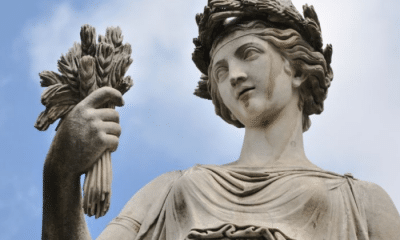Roman
Fortuna: Goddess of Luck in Rome
Whether your luck is good or bad is entirely up to the whims of Fortuna. Keep reading to learn more about Fortuna, goddess of luck in ancient Rome!
If you have ever heard someone invoking Lady Luck or hoping that fortune smiles upon them, you might not have realized that they were invoking an ancient Roman goddess.
Fortuna, the goddess of luck and chance, was a powerful figure in ancient Rome. While fate may have decided a person’s destiny, it was Fortuna who doled out the fortune that befell them.
The actions of the goddess of fortune were often depicted as entirely random. She was sometimes shown blindfolded, spinning a wheel that could land on good luck or bad without prejudice.
Were Fortuna’s actions truly random, though? Even in the modern age, the personification of luck is not always seen as entirely blind.
The Goddess Fortuna and Chance
In Roman mythology, Fortuna was the goddess of luck, chance, and fortune.
She was inspired in large part by the Greek goddess Tyche. While Tyche was generally connected to the fortunes of a city or state, however, Fortuna had a much broader domain.
Roman people invoked Fortuna whenever chance or luck might play a role in their lives. She was seen as a general goddess of fate who could influence events on both a large and small scale.
Like Tyche, Fortuna could give her favor to an entire city or population. In the grand scope of the vast Roman Empire, she could influence the fates of millions of people through a single action.
One of Fortuna’s earliest roles in Roman life was not as a goddess of the state, but as an agricultural goddess.
Like her father, Jupiter, Fortuna could grant bounty to those she chose. In early Rome, she did so in the form of a good harvest.
Farmers thanked Fortuna for bringing them plentiful food, a form of luck that was not guaranteed in the ancient world. She was also a protective goddess who kept crops and grain stores safe from spoilage, fire, rodents, thieves, and other dangers.
The plentiful harvest brought by Fortuna inspired one of her most well-known symbols. The cornucopia, or horn of plenty, is still used today in imagery of plentiful good and good fortune.
The bounty that Fortuna could bring soon expanded beyond agricultural concerns. Fortuna could also bring material wealth.
The concept of good fortune expanded even more to include all forms of luck.
Fortuna was often depicted with a gubernaculum, or ship’s rudder. She was a favorite goddess of sailors and merchants who believed that luck alone protected them against the dangers of the sea.
Gamblers also invoked Fortuna often. In games of chance, which were officially discouraged in Roman culture, success was entirely dependent on the whims of the goddess.
In almost any aspect of life, the goddess of chance could be invoked. Amulets and icons of Fortuna were common throughout the Roman world to earn her constant favor.
As a household goddess, she ensured the safety and prosperity of everyone in the home. This extended even to the household of the Emperor, where she was responsible for the fortunes of the imperial family.
Fortuna was invoked at marriage ceremonies to give prosperity and happiness to the couple. This good fortune could come in many forms, from healthy children and a comfortable life to the personal happiness and safety of the young bride.
In war, many soldiers believed their odds of survival were entirely dependent on chance. Fortuna could bring success to a legion or ensure the survival of a single soldier.
Fortuna was not an entirely benevolent goddess, however. Both good luck and bad were due to her influence.
Seen as a general goddess of fate, the whims of Fortuna could not be predicted. Ill fortune was as much as domain as bounty.
The Wheel of Fortune, one of the goddess’s most enduring symbols, was first mentioned in the 1st century BC. It represented the unpredictable and often changeable nature of luck.
When two potential heirs to the throne died unexpectedly, for example, that was the result of Fortuna. Any bad luck from natural disasters to minor inconveniences were as much a result of Fortuna as good luck was.
My Modern Interpretation
Fortuna was often depicted as blindfolded, another symbol of her fickle nature. Most Romans believed, however, that luck was not entirely random.
The Romans tied fortune and luck to both fate and virtue. While one of these was outside of human control, the idea that fortune was dependent on virtue made Fortuna a less capricious goddess than she initially seemed.
Virtus, or strength of character, was an essential attribute in Roman culture. Leaders in particular invited ill fortune if they lacked this virtue.
In this way, the actions of Fortuna were made less random. While people did not always understand the reasons for her favor, or lack of it, tying Fortuna to the idea of virtus contradicted the idea of a blinded goddess spinning the Wheel of Fortune.
Fortuna could be unpredictable, but a lack of virtue gave reason to events that would otherwise be incomprehensible. Fortuna’s reliance on virtus in her decision making ensured that order, law, and justice were maintained.
The dual depictions of Fortuna as completely random and a result of virtuousness has persisted into the modern era.
The personification of luck remained popular in European culture long after other depictions of ancient deities had become less common. Depictions of Fortuna, or Lady Luck, are still common in Italy today.
As in the past, the whims of fortune are often considered unpredictable, illogical, and incomprehensible. The idea that luck is tied to virtue, however, has never been entirely forgotten.
Christianity defined virtue differently, but placed just as much importance on it as the Romans had in earlier eras. Although fate was less stressed by most Christian traditions, virtue was still believed to play an intrinsic role in a person’s good or back luck.
It is thus still common to hear people question how they earned bad luck or whether they deserve good fortune. While Lady Luck is still shown blindly spinning a wheel, she also hands out favors and punishments based on ancient concepts of virtue.
In Summary
Fortuna was the Roman goddess of luck, chance, and fate. She was inspired by the Greek goddess Tyche but had a much larger role in day to day life.
Many Romans saw Fortuna largely as a goddess who could grant bounty and security through a good harvest. The cornucopia, the agricultural horn of plenty, was one of her many symbols that has endured into the modern age.
Fortuna’s influence over prosperity expanded into all aspects of Roman life. Wealth, safety, health, and even life and death could be subject to the goddess of luck.
Fortuna was often shown blindfolded, symbolizing the randomness of chance. She gave out both good and bad luck without prejudice or preference.
This was also symbolized with the Wheel of Fortune, one of her most common attributes. The spinning wheel could land on any type of luck.
Fortuna was not seen as entirely capricious, though. She was an agent of fate and her blessings were largely tied to Roman ideals of virtue.
A virtuous person, it was believed, could attract more luck. In personal affairs this influenced the course of their own lives, but when that person was a leader or Emperor their virtues could influence the entire Empire.
Fortuna remained a popular symbol of fate and chance into the modern age. While Lady Luck is still often depicted as fickle, the idea that her whims are tied to personal virtue remain as well.





